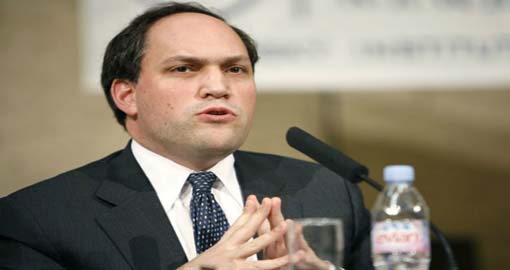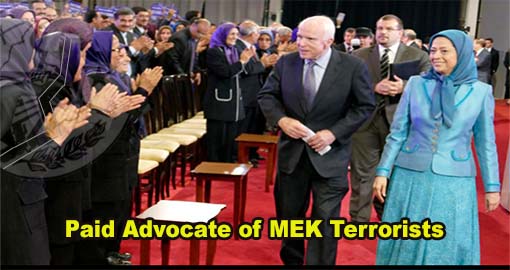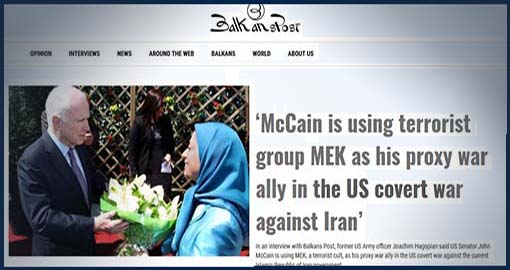Regarding Senator McCain’s meeting with the leader of the Mujahedin Khalq Organization (the MKO), the American prominent journalist Michael Rubin posted an article on AEIdeas denouncing the senator’s “disappointing” act to support the group. Rubin is disappointed with the press release of the MKO propaganda on McCain’s visit of their Tirana base because he is he had regarded McCain as “by any standard, a great and principled American”.
In his article titled “What is John McCain thinking?”, Michael Rubin asks the senator some crucial questions:
“But, if the Chairman of the Armed Services Committee chooses to signal his support for the group, what’s the big deal? After all doesn’t the Mujahedin al-Khalq oppose the Islamic Republic of Iran? Enemy of my enemy etc? Unfortunately, not really. “
Then he presents a brief history on the MKO to prove the group’s untrustworthiness:
“Consider the Mujahedin al-Khalq’s history: It began as a reaction to the growth of Western liberal thought in Iran, embraced anti-American terrorism in the 1970s, and became a significant backer to the Islamic Revolution in Iran before revolutionary leader Ayatollah Khomeini ordered them purged. The Mujahedin responded with terrorism directed not just at the Islamic Republic’s top officials, but at the population at large. At its peak in July 1982, the group assassinated, on average, three regime officials per day. The straw that broke the camel’s back in Iranian public perception was that they sided with Saddam Hussein during the Iran-Iraq War. In effect, they became to ordinary Iranians what John Walker Lindh, the American Taliban, became to the American public.”
Rubin who has an experience of spending seven months in Iran while working on his doctoral dissertation testifies that the MKO enjoys no support among the Iranian public. This American scholar who is a tough critic of the Islamic Republic government does not ignore the hatred that the Iranian people feel towards the MKO. He explains the MKO’s hypocrisy to hide its cult-like nature under the rhetoric of democracy:
“After Operation Iraqi Freedom in 2003, the leadership of the organization changed its tune. Whereas once they had embraced Marxism, Islamism, and then during their Iraqi exile, Baathism, they suddenly reinvented themselves rhetorically as democrats. The problem is that they still operate, if not as terrorists, as a totalitarian cult. Masoud and Maryam Rajavi can even tell members who to marry and divorce. Whereas McCain and other U.S. officials were right to condemn the massacre of the Mujahedin all-Khalq by Iranian forces and their Iraqi proxy militias, this does not mean that the group needs to be tolerated or embraced in any way, shape, or form.”
Although Rubin admits his animosity towards the Iranian government, he warns his favorite senator: “McCain has embraced the enemy of our enemy in the Tehran regime, but he has also embraced the enemy of the Iranian people.”



